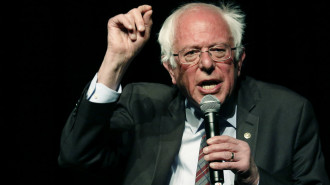In Tunisia, pro-Palestine activists are facing death threats and assassination attempts
In Tunisia, pro-Palestine activists are facing death threats and assassination attempts. They blame authorities for risking their lives by yielding to "American pressure."
Last week, Tunisian authorities informed the Joint Coordination for Palestine of potential assassination attempts targeting key figures within the anti-normalisation coalition.
On 19 August, the coordination reported that activists Salah Al-Din Al-Masri, Khaled Boujemaa, and Saeed Bouajila were targeted because of their vocal support for the Palestinian resistance and "their staunch opposition to the influence of American interests in Tunisia's internal affairs".
The group noted that the authorities did not provide details about those responsible for the threats. However, it held the Tunisian government complicit for blocking the criminalisation of normalisation law "to appease foreign powers".
"The absence of this (anti-normalisation) law is the primary reason for the targeting of (Palestinian) resistance supporters," argues the pro-Palestine group.
Legislative blockade, International pressure
Last November, President Kais Saied blocked a parliamentary vote on a draft law that would have criminalised normalisation with Israel. The proposed legislation included life imprisonment for "crimes of espionage, supporting the Zionist enemy, and bearing arms against Palestinians, along with the crime of submitting to the Zionist entity."
Penalties for "normalisation crimes" under the draft law ranged from 6 to 12 years in prison, with fines of up to 100,000 dinars (US$31,482).
Mohamed Ali, a member of the Rights and Freedoms Committee, which reviewed the bill before it was presented to parliament, claimed that Washington had threatened "economic and military sanctions" if the law were enacted.
President Saied defended his stance by arguing that, since he does not acknowledge the concept of normalisation, it would be counterproductive to legislate on the matter. Foreign Minister Nabil Ammar has also deemed the discussion redundant given Tunisia's lack of formal ties with Tel Aviv.
Recent reports have speculated about a potential normalisation deal between Tel Aviv and Tunis, as Israel seeks to expand its influence in North Africa.
However, President Saied has consistently ruled out any possibility of establishing diplomatic relations with Israel.
Since last October, Tunisian pro-Palestine activists have staged weekly protests against Israel's war on Gaza, urging the expulsion of the United States envoy to Tunis due to Washington's role supporting Israel and blocking a ceasefire resolution in the UN Security Council for months.
Despite the threats, the Joint Coordination for Palestine remains determined to continue its planned protests outside the US embassy in Tunis, calling for an immediate ceasefire in the Gaza Strip, where Israeli attacks have claimed more than 40,000 lives, mostly women and children, since 7 October 2023.
"These (death) threats target all activists who stand with the resistance. We affirm that our lives are no more important or valuable than the lives of our people in Palestine, Lebanon, and Yemen, or than the lives of the martyrs on the frontlines of resistance," said the coalition.




 Follow the Middle East's top stories in English at The New Arab on Google News
Follow the Middle East's top stories in English at The New Arab on Google News
![The US vetoed a UN Security Council (UNSC) resolution demanding a ceasefire in Gaza [Getty]](/sites/default/files/styles/image_330x185/public/2185152251.jpeg?h=7ef8ac04&itok=RpLSj2pu)

![An attack by paramilitary forces in Sudan has killed at least 40 people [Getty]](/sites/default/files/styles/image_330x185/public/2182364341.jpeg?h=a5f2f23a&itok=r8Fkhxdj)